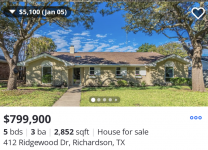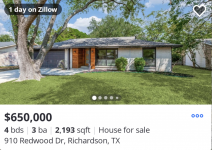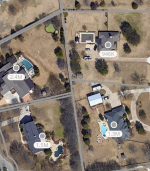Well of course it varies case by case what people’s preferences will be and how much its worth to them to move out of state. The point is that homeowners in a given area should not be pigeon-holed into either of two fairly extreme options (move hundreds of miles away, or don’t EVER move).Eh…. For many Californians I think it’d still be more than enough of a positive benefit.
All my kin I mentioned previously lived in the Bay Area before going out of state and they’ve all said that moving out of California was an easy decision for them to make.
Also don’t forget that moving expenses can be tax deductible.
And this is not just a California problem. Its certainly already happening or soon to be developing in Miami, NYC, Nashville, Austin, DFW, Seattle, Denver, Chicago, DC, etc.
Let’s say a middle class empty nest couple (or individual) in some area that’s experienced exponential home value appreciation wants to sell their home that they own outright, and buy another home with the proceeds from the sale. They want to stay in the same general area, because its where their kids / grandkids are. Very common situation. It’s already guaranteed that the next home will not as big (or not in the great school district, or as updated, or have as much land, or whatever). A reasonable trade-off must almost always be made to account for the fact that the surrounding market appreciation combined with realtor fees will not let you “trade up”. And sellers are generally willing to make this trade-off, particularly when downsizing. But nobody in the middle class can do this AND absorb a tax bill in the hundreds of thousands. Its untenable.
Last edited:




